|
|
|
Sort Order |
|
|
|
Items / Page
|
|
|
|
|
|
|
| Srl | Item |
| 1 |
ID:
128054
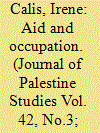

|
|
|
|
|
| Publication |
2013.
|
| Summary/Abstract |
This article foregrounds how international aid and the Israeli occupation intersect in the historically prosperous West Bank agricultural village of Jayyus; with most of its lands isolated behind the Israeli Wall, Jayyus is now aid-dependent. While material aid plays a larger role in sustaining the village, it is through "advocacy work" (a form of international aid largely unaddressed in the literature) that Jayyusis experience aid on a daily basis. The article examines the paradoxes of dependence and subordination seen from the vantage point of local communities under the jurisdiction of an occupying power and in the absence of a sovereign Palestinian state. Also shown is how the routinization of aid both obscures the ongoing status of occupation and has become an important mechanism that sustains it.
|
|
|
|
|
|
|
|
|
|
|
|
|
|
|
|
| 2 |
ID:
151681
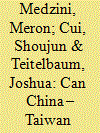

|
|
|
|
|
| Summary/Abstract |
‘Cross-Straits Relations’ is the title given by the protagonists to the relations that evolved in the past 20 years between Taiwan and the People’s Republic of China. Designed to create confidence-building measures and trust and avoid military confrontation in a frozen, abeyant intractable conflict, these ties have grown enormously in trade volume, investments and people’s exchange. The following article poses the question of whether such relations between two hostile regimes might serve as a model for future conflict management of the hot and active intractable conflict between Israel and the Palestinian Authority, and eventually the Arab countries with which Israel does not yet have peace treaties.
|
|
|
|
|
|
|
|
|
|
|
|
|
|
|
|
| 3 |
ID:
170714
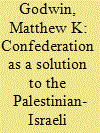

|
|
|
|
|
| Summary/Abstract |
This article analyzes the applicability of the confederative model to the Palestinian-Israeli conflict. Based on a comparative examination of successful and failed federative/confederative experiences in the 20th century, it argues that applying this solution to the Palestinian-Israeli conflict will prove highly challenging if not wholly impossible. This is mainly because of the power asymmetry between two parties; dissimilar political systems (democratic vs authoritarian/dictatorial); restricted Palestinian sovereignty; failure to recognise Jewish self-determination; and the likelihood that this arrangement will need to be imposed
|
|
|
|
|
|
|
|
|
|
|
|
|
|
|
|
| 4 |
ID:
154276
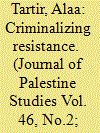

|
|
|
|
|
| Summary/Abstract |
The Palestinian Authority (PA) adopted donor-driven security sector reform (SSR) as the linchpin to its post-2007 state-building project. As SSR proceeded, the occupied West Bank became a securitized space and the theater for PA security campaigns whose ostensible purpose was to establish law and order. This article tackles the consequences of the PA’s security campaigns in Balata and Jenin refugee camps from the people’s perspective through a bottom-up ethnographic methodological approach. These voices from below problematize and examine the security campaigns, illustrating how and why resistance against Israel has been criminalized. The article concludes by arguing that conducting security reform to ensure stability within the context of colonial occupation and without addressing the imbalances of power can only ever have two outcomes: “better” collaboration with the occupying power and a violation of Palestinians’ security and national rights by their own security forces.
|
|
|
|
|
|
|
|
|
|
|
|
|
|
|
|
| 5 |
ID:
173916
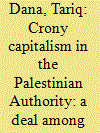

|
|
|
|
|
| Summary/Abstract |
This article interrogates the multifaceted political–economic networks entrenched within the multiple structures of the West Bank-based Palestinian Authority (PA). The main argument of this article is that crony capitalism is a defining feature of the PA’s relations with a handful of capitalists and business groups. The demonstration of this argument is exhibited through the large-scale public and private monopolistic practices in strategic sectors of the Palestinian economy, which function within the framework of Israel’s settler-colonial reality and the persistent patterns of international aid to the occupied West Bank. While acknowledging the existence of cronyism as a feature of the capitalist system in its diverse typologies, crony capitalism may be more pronounced in situations characterised by political uncertainty, whereby political–business collusion strategizes the expansion of neo-patrimonial networks and rent-seeking opportunities as a meta-mechanism for social control and political stabilisation. In the Occupied Palestinian Territories, crony capitalism was developed as part of the political allegiances and economic alliances that underpin the structures created by the Oslo process, which are fostered by Israeli policies and the international donor community to maintain the cohesiveness of the PA regime.
|
|
|
|
|
|
|
|
|
|
|
|
|
|
|
|
| 6 |
ID:
077252
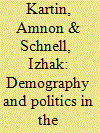

|
|
|
| 7 |
ID:
157983
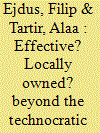

|
|
|
|
|
| Summary/Abstract |
The European Union Police Mission for the Palestinian Territories (EUPOL COPPS) was established in 2006 to contribute to the establishment of effective policing in support of an independent and democratic Palestinian state. EUPOL COPPS is often commended for its contribution to the professionalization of the Palestinian security sector under local ownership. Drawing on 40 interviews, we argue that the mission can be considered effective and locally owned only from a narrow technocratic perspective, which denies the political reality of continued occupation and absence of democracy. A broader analysis, which includes the voices of ordinary Palestinians, reveals that EUPOL COPPS contributed to the professionalization of authoritarian policing under continued Israeli occupation. Our findings show the limits of technocratic approaches to peacebuilding interventions and call for a stronger engagement with the ultimate beneficiaries of peacebuilding missions.
|
|
|
|
|
|
|
|
|
|
|
|
|
|
|
|
| 8 |
ID:
092152
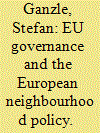

|
|
|
|
|
| Publication |
2009.
|
| Summary/Abstract |
Since 2002 the European Union (EU)1 has sought to flesh out a proximity policy to deal with its immediate vicinity in the light of EU Eastern enlargement. Several labels, such as 'Eastern (and Southern) Dimension', 'Wider Europe', 'European Neighbourhood Policy' (ENP), 'ENP plus' and, eventually-with regards to East European countries outside the EU-'Eastern Partnership' have been used to capture the EU's policy vis-a-vis its different neighbours. So far, Algeria, Israel, the Palestinian Authority, Armenia, Jordan, Syria, Azerbaijan, Lebanon, Tunisia, Ukraine, Egypt, Moldova, Georgia and Morocco have been recognised as 'ENP partner' countries.
|
|
|
|
|
|
|
|
|
|
|
|
|
|
|
|
| 9 |
ID:
165821
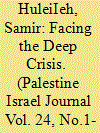

|
|
|
|
|
| Summary/Abstract |
This article is a review of the process that Palestine is entering into, that is, the deep crisis that includes both political and economic ramifications. This crisis is expected to continue for many years with no light at the end of the tunnel and no prospects for resolution using the old tools proposed by the Oslo Accords. This necessitates the opening of a general discussion on multiple levels to explore the close relationship between the political track and economic performance, redefining the role of the Palestinian National Authority (PA) and its official and popular constituencies, whether in the development process or in providing the requisites for building the necessary economic resilience in the next phase.
|
|
|
|
|
|
|
|
|
|
|
|
|
|
|
|
| 10 |
ID:
120320
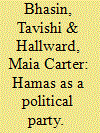

|
|
|
|
|
| Publication |
2013.
|
| Summary/Abstract |
Why do violent movements participate in elections? To answer this question, we examine Hamas's formation of the Reform and Change Party and its iconic victory in the 2006 elections to the Palestinian Legislative Council. We argue that Hamas's formation of this party was a logical step, following nearly two decades of participation in local and municipal elections. Hamas's need to attract resources from external donors, who make funding decisions based on civilian support for the movement, best explains why Hamas decided to participate in local elections in the early 1990s, taking Hamas on a path that eventually led to its 2006 legislative victory. Hamas's foray into elections was consistent with its dual strategy of directing violence against Israel and building Palestinian support through welfare services. We demonstrate that changes in political opportunities (Fatah's decline and the increase in Hamas's popularity), institutional incentives (lax electoral laws and the holding of municipal elections), and the rise of moderate voices within Hamas explain the timing of its entry into legislative elections. Finally, we discuss Hamas's electoral victory, the need for cooperation between Fatah and Hamas, and the role played by international actors as significant factors influencing prospects for peace and democratization in the region.
|
|
|
|
|
|
|
|
|
|
|
|
|
|
|
|
| 11 |
ID:
149634
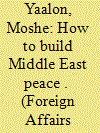

|
|
|
|
|
| Summary/Abstract |
Last May, I resigned from the Israeli government and parliament. I did so largely for reasons of domestic policy, including differences with Prime Minister Benjamin Netanyahu [1] on issues such as respect for the rule of law and the independence of the Supreme Court. National policy toward the Palestinians [2] was not central to my resignation, but it is no secret that I differed on that front as well with some in the government and the Knesset in which I served.
|
|
|
|
|
|
|
|
|
|
|
|
|
|
|
|
| 12 |
ID:
165287
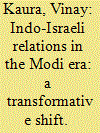

|
|
|
|
|
| Summary/Abstract |
India’s West Asia policy is being constantly reshaped under the tutelage of Indian Prime Minister Narendra Modi, whose Israel visit in July 2017 represents a momentous milestone in the Indo-Israeli relationship. The first ever visit of an Indian prime minister to the Jewish state unambiguously underscores that New Delhi under Modi is confident enough to deal with Israel as it deals with any other state in the volatile West Asian region without being concerned about third parties. Modi has been unequivocal in showing the importance India accords to its ties with Israel.
|
|
|
|
|
|
|
|
|
|
|
|
|
|
|
|
| 13 |
ID:
111724
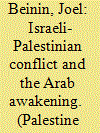

|
|
|
|
|
| Publication |
2012.
|
| Summary/Abstract |
The March 15 Youth Movement, whose name comes from demonstrations held in the West Bank and Gaza Strip that day to demand unity between Fateh and Hamas, is the most direct Palestinian expression of the "Arab Awakening" of 2010-11. The next day, March 16, Fateh's leader, Palestinian Authority (PA) President Mahmoud Abbas, announced his willingness to travel to Gaza to conduct unity talks with Hamas. A reconciliation agreement was signed in Cairo on May 4.
Implementation of the Hamas-Fateh accord stalled earlier this year because Abbas insisted on retaining Salam Fayyad as prime minister of the PA. Hamas regards Fayyad as too subservient to Israel and the West. It particularly resents his cooperation with the United States in creating the new National Security Forces, popularly known as the "Dayton Brigades" after their first trainer, Lt. Gen. Keith Dayton of the US Army. A major task of these units has been to suppress Hamas in the West Bank, and it has done so to Israel's satisfaction.
|
|
|
|
|
|
|
|
|
|
|
|
|
|
|
|
| 14 |
ID:
126891
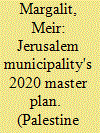

|
|
|
|
|
| Publication |
2011.
|
| Summary/Abstract |
In 2005, I published an article in the Palestine Israel journal (Vol-12, No-1) on the new master plan for Jerusalem which had just got underway: it contained my strong reservations about the guidelines which appeared in the position papers that the Jerusalem municipality had presented.
|
|
|
|
|
|
|
|
|
|
|
|
|
|
|
|
| 15 |
ID:
133686
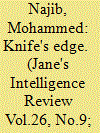

|
|
|
|
|
| Publication |
2014.
|
| Summary/Abstract |
Following the withdrawal of Israel's ground from the Gaza Strip, but with the violence continuing, relations between Hamas, the Palestinian Authority and Tel Aviv have reached a significant juncture. Mohammed Najib explores the dynamics.
|
|
|
|
|
|
|
|
|
|
|
|
|
|
|
|
| 16 |
ID:
169452
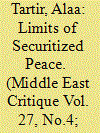

|
|
|
|
|
| Summary/Abstract |
Since the Oslo Accords came into force in 1993, the European Union (EU) and its individual member-states have invested billions of Euros, with a view to establishing the basis for an independent and sovereign Palestinian state. As Israel’s colonization of the Palestinian West Bank has progressed, Palestinian statehood has become little more than a myth. As the state-building process has atrophied, securitization has found a renewed impetus, being elevated at the expense of initiatives that seek to promote democratization. This article argues that, far from being a neutral process grounded within the building of capacities, Security Sector Reform (SSR) has strengthened the foundations of Palestinian authoritarianism. In focusing upon the development of the EU’s police mission in the West Bank (EUPOL COPPS), this article argues that EU-sponsored ‘reform’ has contributed directly to the ‘professionalization’ of Palestinian authoritarianism. The article therefore suggests that the EU consistently has failed to acknowledge the political implications that extend from its technical mandate and interventions. The EU has become, to the extent that its interventions extend Israel’s colonial project, part of the problem. In concluding, the article offers an assessment of the decade-long EUPOL COPPS (The European Union Police Mission for the Palestinian Territories) commitment, with a view to developing key lessons and recommendations that can inform future EU interventions.
|
|
|
|
|
|
|
|
|
|
|
|
|
|
|
|
| 17 |
ID:
151821
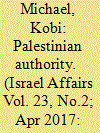

|
|
|
|
|
| Summary/Abstract |
Despite the vast resources poured by the international community into the construction of Palestinian institutions, the PA has failed to build and maintain the infrastructures required for the establishment of a vital, democratic and functioning state. By most common parameters, the PA is a failed entity. Taking into account this experience and the consequences of the last six years of Arab upheavals, characterized by the increasing phenomenon of failed states, there is a need for a paradigm shift that will increase the likelihood of a functioning Palestinian state after a peace agreement with Israel is signed and reduce the risk of its being a failed state that would pose a complex, dangerous challenge for Israel and the neighbouring Arab states.
|
|
|
|
|
|
|
|
|
|
|
|
|
|
|
|
| 18 |
ID:
174259
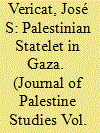

|
|
|
|
|
| Summary/Abstract |
Fatah leaders routinely accuse Hamas of plotting to establish an “emirate” in the Gaza Strip. Gaza is in fact turning into a statelet separate from the West Bank, but it is Israeli policies that are driving the “Gaza is Palestine” option with a series of measures that have been implemented since the early 1990s to sever Gaza from the West Bank. This development has intensified under the administration of U.S. president Donald Trump. In the White House's vision for Middle East peace, which turns the West Bank into a series of isolated Bantustans enveloped by Israeli territory and shorn of Jerusalem, the Gaza Strip becomes the centerpiece of any future Palestinian entity. The international community, laser focused on avoiding another war in Gaza, has prioritized the humanitarian over the political crisis, furthering the excision of the Palestinian territory. As aid flows directly into Gaza, bypassing Ramallah, and Israel and Hamas negotiate a long-term ceasefire, the Palestinian Authority (PA) finds itself increasingly marginalized.
|
|
|
|
|
|
|
|
|
|
|
|
|
|
|
|
| 19 |
ID:
121446
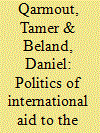

|
|
|
|
|
| Publication |
2012.
|
| Summary/Abstract |
International aid to the Palestinian Authority is conditioned in part on democratization and good governance. However, since Hamas's victory in the 2006 Palestinian Legislative Council elections and its takeover of the Gaza Strip, aid agencies have supported the international boycott of the Hamas government. This article argues that aid agencies, by operating in Gaza while boycotting its government, subvert their mandates and serve the political interests of donors and the PA rather than the humanitarian and development needs of Gazans. As a consequence, assistance has, inadvertently and unintentionally, increased Gazans' dependence on humanitarian aid, impeded economic development, and enabled Israel to maintain its occupation and the blockade of Gaza.
|
|
|
|
|
|
|
|
|
|
|
|
|
|
|
|
| 20 |
ID:
100675
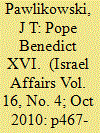

|
|
|
|
|
| Publication |
2010.
|
| Summary/Abstract |
Pope Benedict XVI came to the papacy with a very limited track record in terms of Catholic-Jewish relations generally speaking and virtually no public perspective on political issues related to the ongoing Israeli-Palestinian conflict. Since assuming the papacy he has addressed the Middle East political conflict only on a few occasions save for his trip to the region where he spoke to the question at length throughout his visit to Jordan, Israel and the Palestinian Authority. He was somewhat cautious in his remarks while highlighting several key issues. Pope Benedict affirmed several times during his visit that Christian-Muslim reconciliation was a strongly desired goal on the part of the Vatican. But he also gave his strong endorsement to territorial sovereignty for Israel alongside a Palestinian state. He even implied a direct connection between biblical Israel and the modern state. On numerous occasions he encouraged the local Christian community to stand fast in its faith and not leave the region. For Pope Benedict the continuation of a vibrant Christian community in the Middle East is of the highest priority. The future position of the Pope and the Vatican will no doubt be affected by the reception accorded to the KAIROS Palestine document, the results of the ongoing negotiations between the Holy See and the Israeli government over a host of specific issues such as taxation, clergy permits, etc., the development of a serious peace plan by US President Barack Obama and the conclusions of the Synod on the Middle East in October 2010.
|
|
|
|
|
|
|
|
|
|
|
|
|
|
|
|
|
|
|
|
|